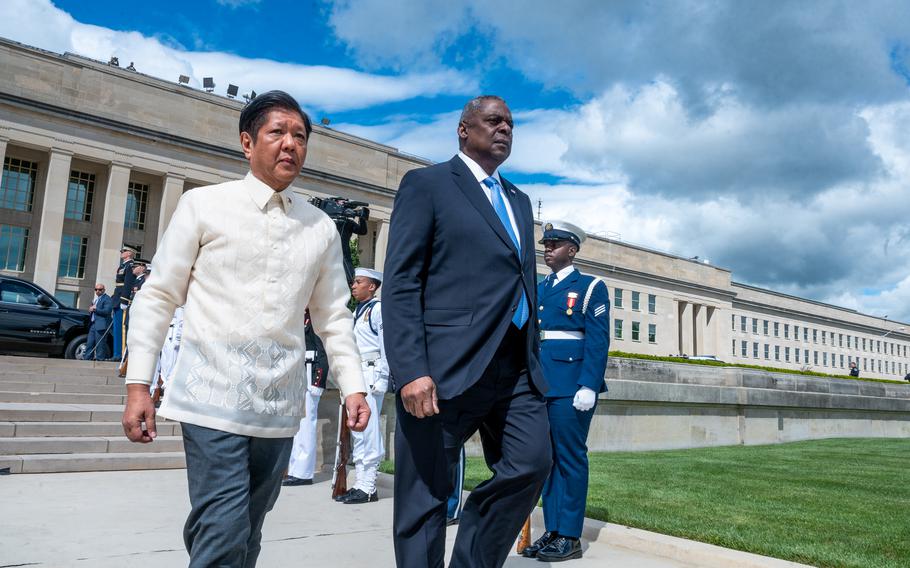
Defense Secretary Lloyd Austin and Philippines President Ferdinand Marcos participate in a meeting at the Pentagon on May 3, 2023. (Jack Sanders/Defense Department)
WASHINGTON — Defense Secretary Lloyd Austin held discussions with Philippines President Ferdinand Marcos Jr. at the Pentagon on Wednesday, and the two set security guidelines to boost cooperation and modernize defenses in the Indo-Pacific region.
The two countries have been cooperating on various new defense measures in 2023, including giving American troops access to four additional bases in the Philippines that are close to Taiwan and other potential trouble spots in the South China Sea.
“They celebrated the remarkable strides the United States and the Philippines have recently made … for a free and open Indo-Pacific region and rules-based international order shared by both countries,” the Defense Department said of the meeting Wednesday between Austin and Marcos.
The meeting produced new bilateral defense guidelines intended to “modernize alliance cooperation” between the United States and the Philippines and keep the Indo-Pacific free from Chinese aggression.
“For decades, the Philippines has been an indispensable friend and ally to the United States,” Austin said.
The deepening of U.S.-Philippines ties is the latest move to seek or bolster defensive partnerships in the region. A year ago, China struck a security agreement with the Solomon Islands — a small country east of Papua New Guinea and northeast of Australia — that caused alarm among Western allies.
The defense guidelines announced Wednesday identify four main goals: reaffirming a 1951 U.S.-Philippines defense treaty, fostering a common understanding of shared roles and capabilities, increasing shared dialogue and coordination in “all areas of bilateral security,” and uniting to solve security problems “of shared concern.”
The 1951 agreement is essentially a promise to help defend one another if either the U.S. or Philippines was attacked by another country.
To help reach the four goals of the new pact, Washington and Manila agreed to modernize defense capabilities, deepen interoperability, and enhance planning and information sharing, according to the agreement.
Air Force Brig. Gen. Pat Ryder, the top Pentagon spokesman, said Tuesday that the U.S. and Philippines are “standing at a transformational moment” in their relationship due to the new leadership under Marcos and China’s rising influence in the Indo-Pacific. Marcos’ predecessor, Rodrigo Duterte, favored closer ties with Beijing.
Specifically, Ryder said one provision of the deal is to “expand operational cooperation in the South China Sea,” a busy ocean channel that lies west of the Philippines and has been the focus of numerous military activities — and disputes — in recent years.
Last week, there was a confrontation in the sea when a Chinese ship tried to block a Philippine vessel and almost caused a collision. In March, Beijing warned the U.S. of “serious consequences” after the Navy conducted a freedom-of-navigation operation in what Beijing said were its territorial waters.
This week, the U.S. and Philippines opened the Cope Thunder airpower drills — joint training that features American and Filipino pilots flying together for the first time since in 1990. Both countries also trained together during their annual Balikatan military exercises last month, which the Pentagon said was the largest ever.
Austin and President Joe Biden have repeatedly labeled China as the top U.S. “pacing challenge” and they have consistently voiced concerns about Beijing’s views on Taiwan and the potential for an invasion. China considers Taiwan a breakaway Chinese territory and has long stated a desire to “reunify” with the island. China and Taiwan are separated by the Taiwan Strait on the northern end of the South China Sea.
Wednesday’s visit marked the first time Marcos, president of the Philippines since last June and the son of longtime dictator Ferdinand Marcos Sr., visited the Pentagon. However, he and Austin met during Austin’s visit to the Philippines in February. Also known as “Bongbong,” the 65-year-old Marcos first visited the U.S. last September and met with Biden during the general debate of the U.N. General Assembly in New York City. He met again with Biden on Monday at the White House.
“This relationship has to continue to evolve,” Biden said in a joint news conference with Marcos. “We are going to continue to support the Philippines’ military modernization goals.”